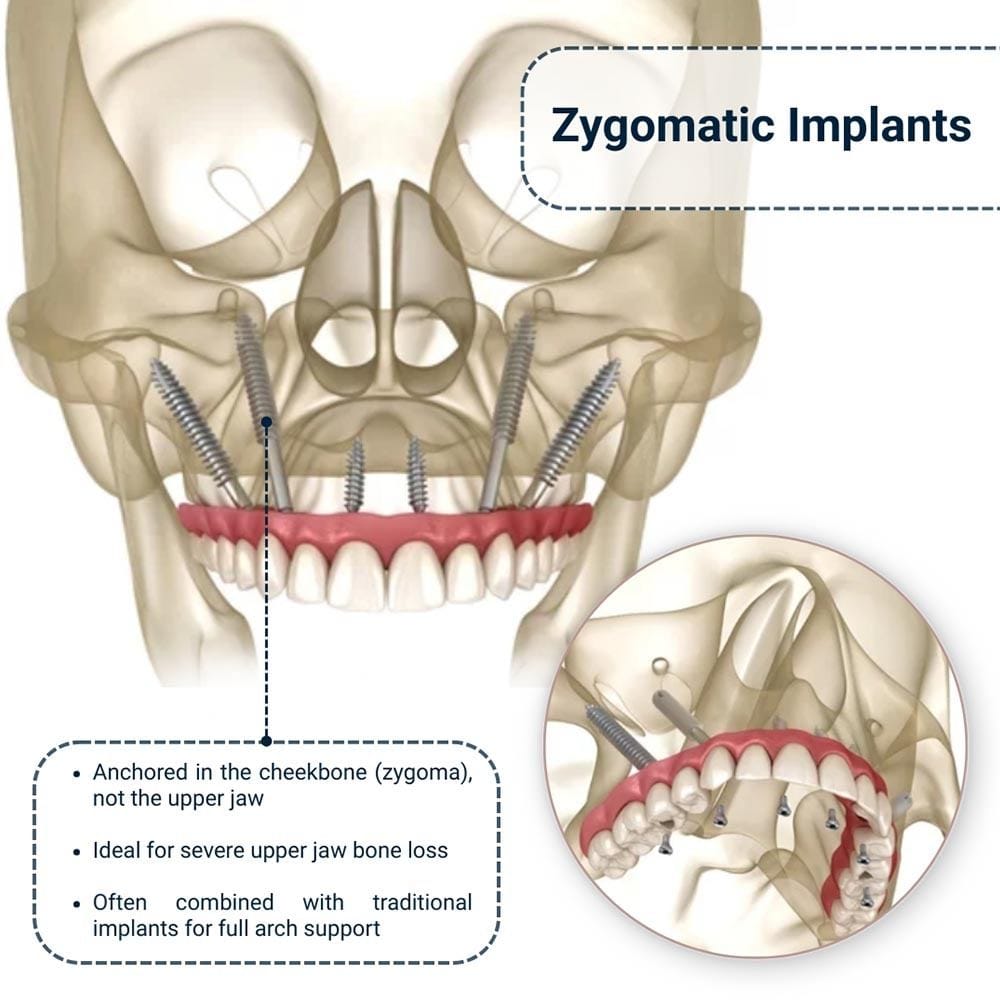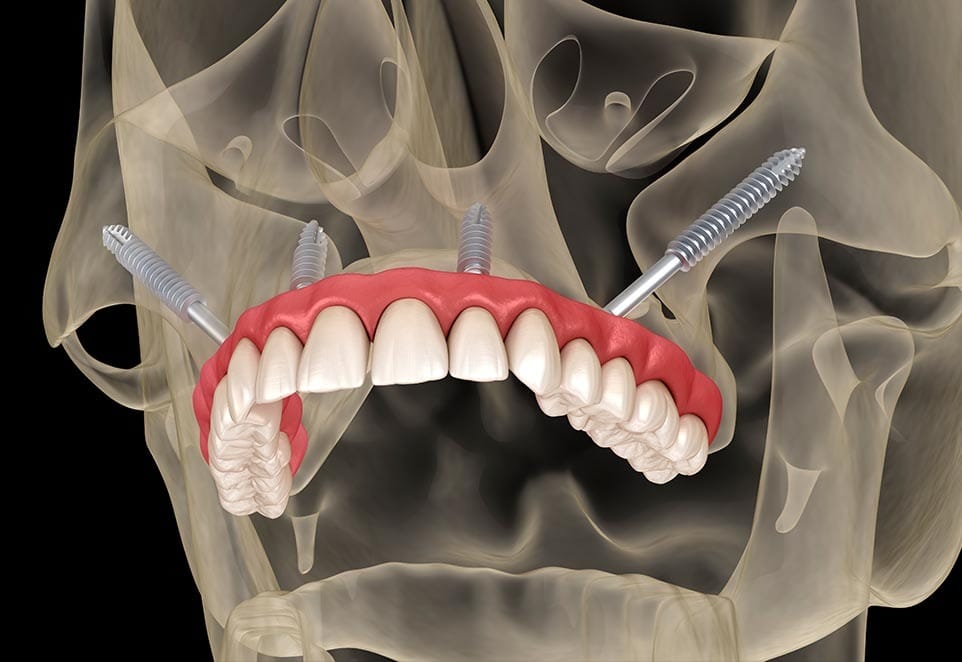Not everybody has sufficient bone to support implants, especially in the upper jaw or maxilla, but the jawbone is naturally thinner and weaker. In this case, zygomatic dental implants could be an alternative.
This article explains the difference between traditional and zygomatic dental implants, when to consider them, and how they can help restore missing teeth.
What Are Zygomatic Dental Implants?
Zygomatic dental implants are much longer than ordinary implants since they are anchored right at the back of the mouth. Instead of being inserted into the jawbone, they are inserted into the zygoma, also called the cheekbone.
Your cheekbone is far denser and stronger and can securely support dental implants. These implants were designed for people with severe jawbone loss in the upper jaw and are sometimes called rescue dental implants.
Often, zygomatic implants are used in combination with traditional implants. These traditional implants are inserted toward the front of the door where the jawbone is naturally stronger and thicker.

When to Consider Zygomatic Dental Implants Over Traditional Implants?
It’s worth investigating zygomatic dental implants if you have previously inquired about implant surgery but have been turned down because of severe jawbone loss in your upper jaw.
Although the jawbone loss can be remedied with dental bone grafting, this solution isn’t right for everyone. Zygomatic implants offer patients an alternative to traditional implants and are especially good for anybody who doesn’t want to have a bone graft or isn’t suitable.
What Is a Bone Graft and Why Is It Frequently Necessary for Traditional Dental Implants?
When someone has traditional dental implants in the upper jaw, it’s not uncommon to require bone grafting. A dental bone graft is a treatment where grafting material, either from the patient’s body, a cadaver, or artificial material, is grafted onto the jawbone in areas where it is deficient.
If the upper back teeth must be restored, a sinus lift is often needed to build up the bone below the sinus cavities. The jawbone in this area is typically thinner, weaker, and less able to support implants.
Although dental bone grafts are very successful, they can lengthen the overall treatment time. A bone graft may require six months or more to heal properly before inserting the implants. Additionally, a dental bone graft will increase the costs of treatment.
What Are the Advantages of Choosing Zygomatic Dental Implants?
Zygomatic dental implants offer several advantages for patients who qualify for treatment, which include:
- The implants can often be immediately loaded with a new dental restoration soon after surgery.
- The need for bone grafting is eliminated.
- Treatment can be more affordable without needing a potentially costly bone graft, such as a sinus lift.
- Treatment is fast, since relatively few implants are needed to restore a complete arch of teeth.
- Zygomatic dental implant surgery can be completed during a single visit.
- Treatment is comfortable using sedation dentistry techniques.
- If you have teeth that are failing, these may be removed and replaced with implants during the same surgery.
Are Zygomatic Dental Implants Effective?
Yes, as they use the cheekbone’s density and strength to provide a strong and predictable anchorage point for a replacement prosthesis. Zygomatic dental implants can significantly improve the quality of life for anyone struggling with complete tooth loss in the upper jaw.
Zygomatic dental implants restore the ability to eat a wider choice of foods, providing good biting and chewing strength. The restorations are carefully designed and fabricated to look and feel natural and help improve the overall quality of life by restoring self-confidence and self-esteem.
Can Any Dental Implant Dentist Plan and Place Zygomatic Dental Implants?
This procedure is very skilled and requires advanced training, expertise, and considerable experience. If you are considering this treatment, ensure you see a dental implant dentist with the skills needed.
You may need to find a practice with an oral surgeon or a periodontist on their team. You should also make sure they have all the proper equipment on-site so the entire treatment can be completed in one location and with a dental team you know and trust.
What to Expect When You Have Zygomatic Dental Implants?
Before you have zygomatic dental implant surgery, you will need a diagnostic cone beam CT scan, digital dental x-rays, and possibly digital photos. The 3-D cone beam CT scan is especially important because it shows your jawbone and cheekbone in high-quality detail, allowing your implant surgeon to plan the procedure precisely.
They will use computer-guided surgery to ensure each dental implant is inserted accurately and precisely. This method also ensures that treatment is more comfortable and quicker.
Two or four longer implants are placed into the zygoma or cheekbone during implant surgery. Sometimes, two or four traditional dental implants are inserted at the front of the jaw, where your upper front teeth were located. However, this is not always possible and depends on the condition of your upper jaw.
Your new implant teeth can be created before surgery so they can be fitted onto the implants soon afterward. These teeth can be non-removable. Alternatively, you may have a removable implant overdenture. This clips onto a bar fitted onto the implants, firmly holding the denture. Some people may find this solution easier to look after.
Your new teeth may be temporary and replaced with more permanent teeth once healing is complete. It could take three months or longer for your new dental implants to heal and integrate with your jawbone.
Will Zygomatic Dental Implant Surgery Feel Painful?
There is no reason modern dentistry should feel painful. Your implant dentist will ensure the jaw and cheekbone are thoroughly numb and will probably suggest using sedation dentistry to help you relax fully.
Dental sedation can be given continuously during treatment using intravenous sedation. As modern dental sedatives can contain an amnesiac, you will most likely remember nothing or very little about your treatment.
What to Expect after Zygomatic Dental Implant Surgery
Once the anaesthetic wears off, you may experience mild discomfort and bruising. Usually, this is easily managed with over-the-counter pain relief, or your dentist can prescribe something stronger. They may also prescribe antibiotics, and if so, ensure you complete the course to reduce the risk of infection.
Your implant dentist will also give precise instructions on caring for your mouth while it heals, and what to eat during healing. Following this advice carefully will help ensure your recovery is smoother, quicker, and more comfortable.
What Is the Success Rate of Zygomatic Dental Implant Surgery?
These implants have a high success rate because your implant dentist will carefully assess you for treatment. They will review your dental and medical history to make sure you are a suitable candidate and that you understand the process fully.
Zygomatic dental implants are not new. They were introduced in Europe in the 1980s and the United States in the late 1990s. Since then, they have been extensively studied and reviewed to assess their long-term success. Your implant dentist can provide you with more information if you are interested.
Do you currently have an upper denture that is loose and uncomfortable? Have you previously been told dental implants are not for you? Contact the experienced team at Clock Tower Dental to ask about zygomatic dental implants instead. They could be the solution you need to restore your smile and oral health.

